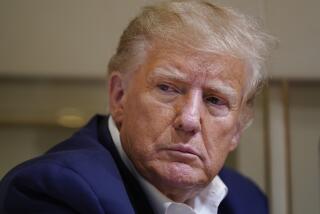Probers Press Weinberger on Reagan Arms Sale Role
- Share via
WASHINGTON — Iran-Contra prosecutors, convinced that the Ronald Reagan Administration mounted a deliberate cover-up of secret arms sales to Iran, are pressing former Secretary of Defense Caspar W. Weinberger for information they think he has about Reagan’s role in the affair.
The prosecutors are questioning Weinberger about his own knowledge of the Iran-Contra affair as revealed in personal notes he made during White House meetings and other diary entries, sources familiar with the investigation said.
But the chief object of interest of independent counsel Lawrence E. Walsh and his team appears to be Reagan. The former President has given varying accounts of what he knew about the arms deals, which were intended to win the freedom of American hostages held in Lebanon.
Prosecutors believe some of Weinberger’s notes suggest that he and Reagan knew more about the arms sales than they subsequently admitted, a source said. But Weinberger and his lawyer, Robert S. Bennett, contend the notes--which Weinberger first made available to prosecutors in 1990--show no such thing.
Another source said there are references in Weinberger’s notes that could be read as supporting either his argument or that of the prosecutors. “They’re debatable,” the source said.
A key issue in the investigation is a November, 1985, shipment of U.S.-made Hawk anti-aircraft missiles from Israel to Iran. The shipment was potentially illegal for several reasons, including that the Central Intelligence Agency participated in it without proper authorization.
After the scandal erupted in 1986, Reagan insisted that he learned of that shipment only after it occurred. But his national security adviser at the time, Robert C. McFarlane, testified under oath that he had told Reagan beforehand.
Weinberger also maintained that he did not know about the shipment at the time. “I have no memory of that whatever,” he said in a 1987 deposition for a congressional committee investigating the scandal. “I am sure I would remember it because, in my opinion, it would have been a violation” of U.S. law.
However, Pentagon documents showed that on about Nov. 18, 1985--shortly after the Hawk sale was approved, but before the shipment was completed--Gen. Colin L. Powell, then Weinberger’s military aide, ordered other officials to prepare a paper listing the reasons a Hawk sale should not go ahead.
Those documents indicated that officials in Weinberger’s office knew about the sale and were trying to stop it. But Weinberger said he did not remember seeing those documents at the time.
Powell is currently chairman of the Joint Chiefs of Staff. Weinberger, who retired as secretary of defense in 1987, is now publisher of Forbes magazine.
Ironically, Weinberger doggedly opposed the arms-for-hostages deal, and argued bitterly with Reagan to halt them. The former defense secretary has pointed out to the prosecutors that the notes they are examining show that he denounced the scheme at a Dec. 7, 1985, White House meeting--after the November shipment had already been made.
One matter is clear by accounts from sources supportive of both sides: Walsh, nearing the end of his investigation, is clearly undecided about the advisability of seeking prosecution of former Cabinet officers.
Walsh’s aides have also been investigating the statements and actions of former Secretary of State George P. Shultz, on issues similar to those involving Weinberger, the sources said.
Shultz, now a fellow at Stanford University’s Hoover Institution, has said his earlier testimony was truthful and complete.
Several sources familiar with the investigation cautioned against reading much significance into the fact that the federal grand jury that had been probing the Iran-Contra scandal for two years went out of existence last week.
There would be no difficulty in referring investigative results and proposed charges to a new grand jury, these sources maintained.
More to Read
Sign up for Essential California
The most important California stories and recommendations in your inbox every morning.
You may occasionally receive promotional content from the Los Angeles Times.














